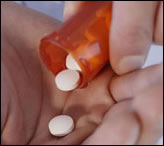Can
Statins Reduce Inflammation in People with HIV?
 |
 |
 |
 |
| SUMMARY:
Statin medications such as
atorvastatin (Lipitor), usually used to lower blood
cholesterol, may also reduce immune activation in
HIV positive people, according to a small study
described in the
March 15, 2011, Journal of Infectious Diseases.
Reducing immune activation and inflammation may
decrease the risk of chronic non-AIDS conditions
such as cardiovascular disease, but a much larger
study will be required to demonstrate clinical benefits. |
|
 |
 |
 |
 |
By
Liz Highleyman
 There
is now substantial evidence that excessive immune activation
and chronic low-level inflammation triggered by persistent
virus may help explain the higher risk of cardiovascular disease,
neurocognitive dysfunction, and other non-AIDS conditions
seen in people with HIV,
even while CD4+ T-cell counts remain high. Large studies including
SMART
and FRAM have found that elevated
levels of inflammation biomarkers are associated with increased
risk of death, progression to AIDS, and non-AIDS conditions.
There
is now substantial evidence that excessive immune activation
and chronic low-level inflammation triggered by persistent
virus may help explain the higher risk of cardiovascular disease,
neurocognitive dysfunction, and other non-AIDS conditions
seen in people with HIV,
even while CD4+ T-cell counts remain high. Large studies including
SMART
and FRAM have found that elevated
levels of inflammation biomarkers are associated with increased
risk of death, progression to AIDS, and non-AIDS conditions.
In
the present study, Anuradha Ganesan from the National Naval
Medical Center and colleagues conducted a randomized trial
to investigate the effects of atorvastatin on viral load and
cellular markers of immune activation among HIV positive people
who were not on antiretroviral
therapy (ART).
Statins -- also known as HMG-CoA reductase inhibitors -- were
developed and approved for reducing LDL "bad" cholesterol
in the blood, but more recent research has shown that they
also reduce inflammation throughout the body. A few studies
have suggested that statins may suppress HIV replication and
lower viral load, but data are conflicting.
Ganesan's group analyzed 24 participants who were randomly
assigned to receive either 80 mg atorvastatin or placebo each
day for 8 weeks. Then, after a 4-6 week "washout"
period, they switched to the other treatment assignment.
All participants were men, 63% were white, and they were relatively
young, with a median age of 30 years. They had CD4+ cell counts
above 350 cells/mm3 and none were on ART. Their LDL cholesterol
levels were below the usual threshold for using statins (<
130 mg/dL). All but 2 patients completed the study.
The researchers measured HIV RNA levels as well as immune
activation, indicated by expression of CD38 and HLA-DR surface
markers on CD4+ and CD8+ T-cells. They did not, however, measure
inflammation biomarkers such as C-reactive protein.
Results
 |
HIV
RNA levels did not change significantly overall during
either the atorvastatin or placebo phases of the study. |
 |
People
taking atorvastatin showed a significant reduction in
proportions of CD4+HLA-DR+, CD8+HLA-DR+, and CD8+HLA-DR+CD38+
T cells (-2.5%, -5%, and -3%, respectively), which was
not seen among placebo recipients. |
 |
Reductions
in immune activation did not correlate with decreases
in blood levels of LDL cholesterol. |
 |
Participants
who had the largest reductions in immune activation, however,
also saw the greatest declines in viral load. |
Based
on these findings, the investigators concluded, "Short-term
use of atorvastatin was associated with modest but statistically
significant reductions in the proportion of activated T lymphocytes."
While this study was not large enough and not designed to
demonstrate a clinical benefit, the authors said that understanding
the mechanisms by which statins influence immune activation
markers may suggest new approaches for managing inflammation
and its detrimental effects in people with HIV. They noted,
however, that it will be important to also study the effects
of statins in people on ART with undetectable viral load.
In an accompanying
editorial, Andrew Carr from St. Vincent's Hospital in
Sydney speculated that other statins besides atorvastatin
are unlikely to suppress HIV.
He recommended that this class of drugs should be further
assessed in larger and longer trials to evaluate their effects
on HIV-related inflammation, but acknowledged that "[a]
very large study would probably be required to determine whether
the potentially positive effects of statin therapy on inflammatory
markers will translate into less HIV disease progression and
fewer cases of inflammatory non-AIDS-related illnesses, such
as cardiovascular disease and end-stage liver disease."
Investigator affiliations: National Naval Medical Center,
Division of Infectious Diseases and Infectious Disease Clinical
Research Program, Uniformed Services University, Bethesda,
MD; Naval Medical Center San Diego, Division of Infectious
Diseases, CA; AIDS Monitoring Laboratory, Clinical Services
Program, Science Applications International Corporation-Frederick,
Inc, National Cancer Institute, Frederick, MD; Biostatistics
Research Branch, Clinical Research Section, National Institute
of Allergy and Infectious Diseases, Bethesda, MD; Department
of Medicine, Drexel University College of Medicine, Philadelphia,
PA; Merck Research Laboratories, North Wales, PA; Pharmaceutical
Product Development, Incorporated, Wilmington, DE; HIV Drug
Resistance Program, National Cancer Institute, National Institutes
of Health, Frederick, MD.
2/25/11
References
A
Ganesan, and others. High dose atorvastatin decreases cellular
markers of immune activation without affecting HIV-1 RNA levels:
results of a double-blind randomized placebo controlled clinical
trial. Journal of Infectious Diseases 203(6): 756-764
(free
full text). March 15, 2011.
A
Carr. Statins as anti-inflammatory therapy in HIV disease?
(Editorial). Journal of Infectious Diseases 203(6):
751-752 (free
full text). March 15, 2011. March 15, 2011.
